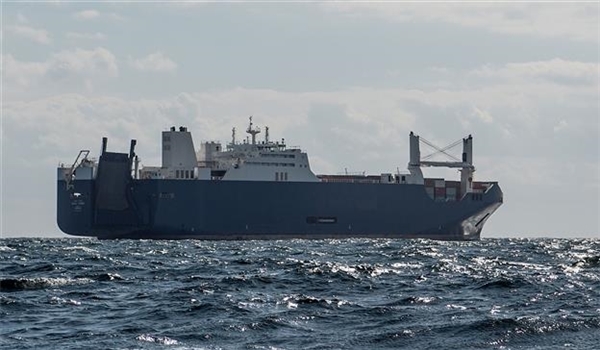
TankerTrackers.com reported that the Iranian-flagged ship Golsan left Shahid Rajaee Port in Iran’s Southern city of Bandar Abbas on May 17 and is now in the Caribbean waters, heading towards the Venezuelan shores.
The ship is expected to dock in the Latin American country’s ports over the next couple of days.
Earlier, Russ Dallen, the head of the Miami-based investment firm Caracas Capital Markets, said the cargo ship “is carrying parts to continue repairing Venezuela’s collapsed refineries”.
Dallen added that the Iranian vessel — sailing at a speed of about 13.1 knots — is expected to anchor in Venezuelan ports on Sunday or Monday. The ship approached Caribbean waters on Friday following a high-seas journey from Iran.
Earlier in the month, five Iranian oil tankers carrying millions of barrels of gasoline and components entered the ports of the fuel-starved South American country and are now on their way back to Iran.
Venezuelan President Nicolas Maduro appreciated Iran, China, Russia and Ciba for their assistance to Caracas, describing them as the real friends of his country.
“Humanitarian aid is coming from China, Russia, Iran and Cuba. They are (Venezuela’s) true friends,” Maduro said in a speech broadcast by the state TV.
He recalled that the US was offering $20 million worth of help, “but not a single dollar came through”.
Secretary of Iran’s Supreme National Security Council (SNSC) Rear Admiral Ali Shamkhani noted that the return of his country’s fuel tankers from Venezuela, and said the fools who were after besieging Tehran now feel overpowered by Tehran.
“Iranian tankers, having accomplished their mission successfully, are coming back to the country. This means that the strategy of active resistance has been efficient and the idiots who were seeking to lay siege on us, have now been trapped in the siege stemming from Iran’s might,” Shamkhani wrote in his Twitter account.
“Trump and Hook’s begging for negotiation testifies to this very claim,” the top security official said.
Iran’s fuel supply to Venezuela has sharply irked the US as the oil sectors of both countries are subject to draconian American sanctions.
A US official said last month that President Donald Trump’s administration was considering responses, prompting Tehran to warn of retaliatory measures if Washington causes any problem for the tankers.
In response, President Rouhani said his country is always entitled to defend its sovereignty and territorial integrity, and warned that if his country’s oil tankers in the Caribbean or anywhere in the world get into trouble by the Americans, Tehran will definitely retaliate.
“Although some of the US measures have created unacceptable conditions in different parts of the world, we will not be the initiator of tension and clash,” Rouhani said in a phone call with the Qatari Emir, Sheikh Tamim bin Hamad Al Thani last month.
Referring to the American moves in the Caribbean, he reiterated, “If our oil tankers face problems in the Caribbean Sea or anywhere in the world by the Americans, they will face problems reciprocally.”
We see the conditions today more apt for cooperation, especially given the outbreak of this disease; but the US continues its incorrect decisions and inhumane behaviors, the president noted.
He made it clear, “As before, we stress that the security of our region, particularly the marine security, is maintained by the regional countries and we have always announced that we are ready for cooperation with the neighboring countries.”
Earlier this month, Caracas announced that the fuel-hungry Latin American country is mulling imports of more gasoline and other oil products from Iran.
The announcement came after Venezuela received five shipments of fuel from Iran in the face of US sanctions.
“Tehran yesterday offered to supply Venezuela with more gasoline and refinery additives. President Maduro very likely will accept the offer because we need the fuel,” an official at Maduro’s office was quoted by price reporting agency Argus Media.
Other officials said the government will ask Iran for further supplies in coming weeks to give state-run oil company PDVSA more time to revive part of its refining capacity.
Maduro said he would visit Iran once health conditions resulting from the new coronavirus outbreak permit in order to thank the Iranian government and sign a “high-level bilateral agreement strengthening energy, financial and military ties”.
“I am obliged to go to personally thank the people,” Maduro said in a state television address, without providing a date for the visit.




